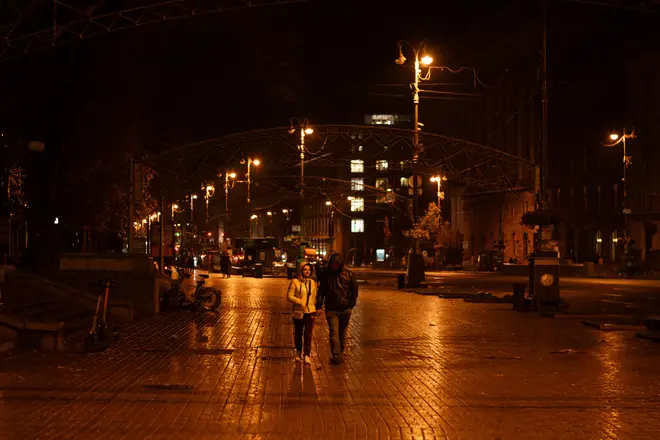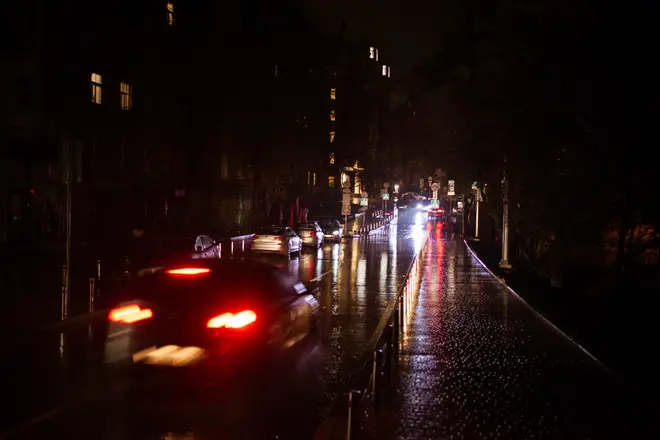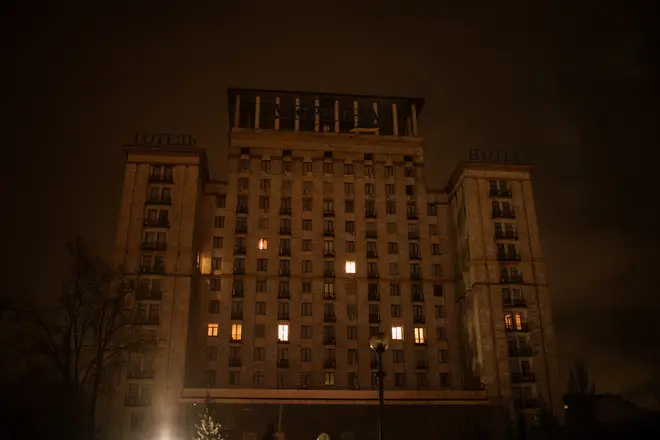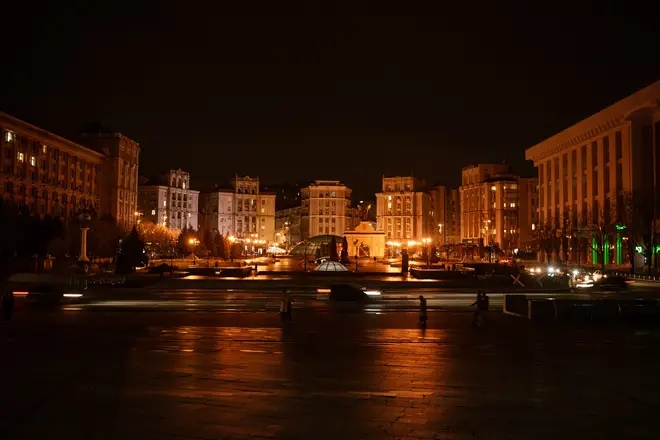
James O'Brien 10am - 1pm
4 November 2022, 06:07

Around 4.5 million people in Ukrainian cities have been left without power after Vladimir Putin targeted the country’s energy network.
Ukraine’s president Volodymyr Zelenskyy accused the Kremlin of ‘energy terrorism’ after attacks on the nations power grid.
He said millions of people were without power after missile and drone attacks were launched on Ukrainian power facilities.
"The very fact that Russia is resorting to energy terrorism shows the weakness of our enemy," said Mr Zelenskyy.
"They cannot beat Ukraine on the battlefield, so they try to break our people this way."
Russia's ministry of defence has confirmed it is targeting Ukrainian energy infrastructure.

Ukraine's nuclear state operator said Russia shelled and damaged power lines connecting Europe's largest nuclear power plant to the Ukrainian grid, leaving the plant reliant on diesel generators again.
The generators have enough fuel to maintain the Zaporizhzhia nuclear power plant in south-east Ukraine for 15 days, Energoatom said in a post on its Telegram channel on Thursday.
Read more: Russia claims it has 'evidence' that the UK was involved in attack on its warships
Read more: Suella Braverman 'booed by migrants' after visiting camps in a military helicopter
"The countdown has begun," Energoatom said, saying it has limited possibilities to "maintain the ZNPP in a safe mode", raising fears of a potential nuclear disaster.
Russia gave a different account, blaming Ukraine. The Russian state-run news agency Tass quoted an official at Russia's nuclear power operator, Rosenergoatom, as claiming that Ukraine had switched off two power lines providing the nuclear plant with electricity.

The official, Renat Karchaa, said the move deprived the city of Energodar, where the plant's workers live, of heating.
He confirmed emergency backup diesel generators had to be switched on to cool the reactors and run other safety systems but denied the problems had been caused by Russian shelling of power lines.
The International Atomic Energy Agency (IAEA) said on Thursday the plant's latest switch to backup power further underlines "the extremely precarious nuclear safety and security situation at the facility and the urgent need to establish a protection zone around it".
The development "again demonstrates the plant's fragile and vulnerable situation," Rafael Grossi, the director general of the UN nuclear watchdog, said.
Relying on diesel generators "is clearly not a sustainable way to operate a major nuclear facility," Mr Grossi added. "Measures are needed to prevent a nuclear accident at the site. The establishment of a nuclear safety and security protection zone is urgently needed."
With its six reactors inoperative, the plant relies on outside electricity to cool its spent fuel.
Russia and Ukraine have traded blame for months amid the war for shelling at and around the plant the IAEA has warned could cause a radiation emergency.

The nuclear power plant lies within part of the Zaporizhzhia region that has been occupied by Russian forces since the early days of the war, which began when Russia invaded Ukraine on February 24.
Although Russian President Vladimir Putin signed a decree transferring the plant to Russian ownership, Ukrainian workers continue to run it.
Energoatom has repeatedly called for the withdrawal of Russian forces from the plant and the creation of a demilitarised zone around it.
Russia has shelled two power lines connecting the plant to the Ukrainian grid overnight, Energoatom said.
The operator said the Russian side will try to repair the power lines in order to connect the plant to the Russian grid and therefore supply power to occupied Crimea and the parts of the eastern Ukrainian region of Donbas also currently controlled by Russia.
Across the Dnipro River from the power plant, the city of Nikopol was also shelled, damaging residential buildings, a petrol station and several private enterprises, Ukrainian President Volodymyr Zelensky's office said on Thursday.
Other Ukrainian cities were also hit, with Russia using drones, missiles and heavy artillery to leave six civilians dead and 16 others wounded, according to the president's office.
Energy and water infrastructure facilities were hit in Kryvyi Rih, leaving several districts without electricity or water in Mr Zelensky's native city, which had a prewar population of 635,000 people, local governor Oleksandr Vilkul said.
Further east in the Donetsk region, battles continued for the towns of Bakhmut and Avdiivka, where authorities said the population are living without electricity or heat and are under constant shelling.
Over the past day, six cities and villages in the region have been attacked by heavy artillery, while in the north east, Ukraine's second-largest city of Kharkiv was hit by three missiles, officials said.
Separately, seven ships carrying agricultural products set sail from Ukrainian seaports heading to Asia and Europe, a day after Russia agreed to rejoin a wartime agreement allowing Ukrainian grain and other commodities to be shipped to world markets.
In announcing Russia was rejoining the pact, Mr Putin said Moscow has received assurances Ukraine will not use the humanitarian corridors to attack Russian forces. He said Russia reserves the right to withdraw again if Kyiv breaks its word.
Russia had suspended its participation in the grain deal over the weekend, citing an alleged drone attack against its Black Sea fleet in Crimea. Ukraine did not claim responsibility for an attack and Mr Zelensky said on Wednesday that Moscow's return to the agreement showed "Russian blackmail did not lead to anything".
In Moscow, the Russian Foreign Ministry summoned UK ambassador Deborah Bronnert on Thursday, saying she was called in connection with the alleged participation of British instructors in the October 29 attack by drones on Black Sea fleet facilities in Sevastopol in Crimea.
Ms Bronnert made no comment upon leaving the ministry after a meeting that lasted about 30 minutes.
The ships setting sail on Thursday included one carrying sunflower seeds bound for Oman, and one carrying corn heading to China, according to the Ministry of Infrastructure.
Since the deal was reached in August, 430 ships have exported million of tonnes of Ukrainian agricultural products to countries in Africa, Asia and Europe. The infrastructure ministry said export volumes in October "could have been 30-40% higher if Russia had not artificially blocked inspections in the Bosphorus".
Meanwhile, Kremlin-backed authorities in the Donetsk region announced another prisoner exchange on Thursday. The Moscow-installed acting head of the region, Denis Pushilin, said on Telegram each side would swap 107 military personnel.
Ukraine has not confirmed the swap. In the last prisoner exchange, each side released 50 people.
Donetsk is another of the regions of Ukraine Mr Putin annexed last month in violation of international law. Before Russia invaded Ukraine, Mr Pushilin led a self-proclaimed separatist republic in part of the region, and the Russian military has worked to capture the territory still in Ukrainian hands.
